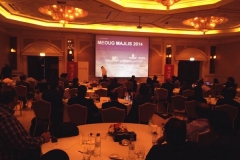Mark Hurd and Larry Ellison Unveil New Oracle ERP Cloud Features at OpenWorld 2018
6 Comments
Oracle
(on 10-Apr-2019 02:01 PM)
Oracle often saves its biggest product announcements — unveiling improved functionality, new features and technologies, or general user-experience upgrades — for its annual OpenWorld conference. In 2018, Oracle revealed artificial intelligence integrations throughout its range of Oracle Cloud applications. CEO Mark Hurd used his first Oracle OpenWorld 2018 keynote presentation to highlight the ways this AI integration benefits Oracle Cloud users, focusing some of his comments on how AI supports users of Oracle Enterprise Resource Planning Cloud.
Hurd provided several real-world AI use cases for Oracle ERP Cloud during his keynote. He noted that “30 percent of finance organisations' time is spent moving around spreadsheets.” AI-driven automation, he said, “allows people to focus on higher-order tasks” by eliminating virtually all of this manual data-entry, recordkeeping, and tracking work.
Hurd also predicted that “all cloud apps will include AI” by 2025 during his first of two OpenWorld keynotes. Oracle’s push for integrated AI is one key to securing its lead in the booming market for cloud applications and services. Hurd and Oracle founder Larry Ellison have positioned the company ahead of the pack in this regard, with this advanced functionality providing another compelling reason to sway ERP users to Oracle ERP Cloud.
Ellison also highlighted other benefits of automation for Oracle Cloud users during one of his OpenWorld 2018 keynotes. His “Think Autonomous” presentation, which walked the audience through the advantages of Oracle Autonomous Database, concluded with this statement: “Autonomous Database... eliminates human labor... and human error. There's nothing to learn, nothing to do. Your developers become more productive, they bring up new applications, and they do a better job of analyzing data. Your system is more reliable, and it never goes down.”
Oracle ERP Cloud’s ability to seamlessly interact with applications for other core business operations has already saved finance professionals time and manual effort. To date, Oracle ERP Cloud has been made to integrate seamlessly with more than 1,000 available Oracle Cloud applications, and more integrations are added all the time as Oracle’s range of cloud applications continues to grow. Tapping into data generated in other departments provides finance teams with deeper and more complete insights into their organisation’s financial performance. AI now provides finance teams the option of generating these insights automatically from the information constantly flowing into their corporate databases. Oracle ERP Cloud, when combined with Oracle Autonomous Database, gives finance departments deeper analytical options while simultaneously improving organisational data security.
A chatbot that assists with expense reporting and an automated vendor or supplier assessment and payment toolkit have also been added to Oracle ERP Cloud. Oracle’s chatbot speeds processing and improves the accuracy of employee-submitted expense reports, taking another element of manual data manipulation off the plates of busy finance professionals.
Oracle ERP Cloud’s existing expense-reporting app is still available for users who’ve grown familiar with it, but the new chatbot gives employees a way to handle their work expenses without needing to install or understand a dedicated application. This should create a better reporting experience for finance departments and front-line employees.
Oracle ERP Cloud’s procurement apps now allow users to save more time and control more costs by adding AI to existing payment analytics functions. This automates a good deal of the supplier network management process by using AI to assess every supplier’s historical performance. The output of this analysis provides finance departments with smarter recommendations for making purchase offers. It also gives organisations real-time accuracy in supplier analytics, eliminating the manual processes formerly involved in generating risk and cost analyses.
Oracle ERP Cloud applications can provide smarter and greater insight into data collected and assessed by every app in the suite, creating a more complete understanding of an organisation’s financial past, present, and future. All core apps now come with integrated AI, including:
For example, human resources departments can better assess the ROI of prospective hires or proposed employee training programs by combining Oracle Human Capital Management Cloud with Oracle ERP Cloud. Oracle ERP Cloud’s procurement functionalities can be greatly extended when paired with Oracle Supply Chain Management Cloud. Oracle Enterprise Performance Management bolsters the analytics and modeling capabilities of ERP Cloud. And, finally, Oracle’s Customer Experience (CX) cloud can improve its marketing and customer service outcomes by tapping into the AI-driven financial performance insights generated by ERP Cloud.
Learn more about Oracle ERP Cloud:
Hurd provided several real-world AI use cases for Oracle ERP Cloud during his keynote. He noted that “30 percent of finance organisations' time is spent moving around spreadsheets.” AI-driven automation, he said, “allows people to focus on higher-order tasks” by eliminating virtually all of this manual data-entry, recordkeeping, and tracking work.
Hurd also predicted that “all cloud apps will include AI” by 2025 during his first of two OpenWorld keynotes. Oracle’s push for integrated AI is one key to securing its lead in the booming market for cloud applications and services. Hurd and Oracle founder Larry Ellison have positioned the company ahead of the pack in this regard, with this advanced functionality providing another compelling reason to sway ERP users to Oracle ERP Cloud.
Ellison also highlighted other benefits of automation for Oracle Cloud users during one of his OpenWorld 2018 keynotes. His “Think Autonomous” presentation, which walked the audience through the advantages of Oracle Autonomous Database, concluded with this statement: “Autonomous Database... eliminates human labor... and human error. There's nothing to learn, nothing to do. Your developers become more productive, they bring up new applications, and they do a better job of analyzing data. Your system is more reliable, and it never goes down.”
Oracle ERP Cloud’s ability to seamlessly interact with applications for other core business operations has already saved finance professionals time and manual effort. To date, Oracle ERP Cloud has been made to integrate seamlessly with more than 1,000 available Oracle Cloud applications, and more integrations are added all the time as Oracle’s range of cloud applications continues to grow. Tapping into data generated in other departments provides finance teams with deeper and more complete insights into their organisation’s financial performance. AI now provides finance teams the option of generating these insights automatically from the information constantly flowing into their corporate databases. Oracle ERP Cloud, when combined with Oracle Autonomous Database, gives finance departments deeper analytical options while simultaneously improving organisational data security.
A chatbot that assists with expense reporting and an automated vendor or supplier assessment and payment toolkit have also been added to Oracle ERP Cloud. Oracle’s chatbot speeds processing and improves the accuracy of employee-submitted expense reports, taking another element of manual data manipulation off the plates of busy finance professionals.
Oracle ERP Cloud’s existing expense-reporting app is still available for users who’ve grown familiar with it, but the new chatbot gives employees a way to handle their work expenses without needing to install or understand a dedicated application. This should create a better reporting experience for finance departments and front-line employees.
Oracle ERP Cloud’s procurement apps now allow users to save more time and control more costs by adding AI to existing payment analytics functions. This automates a good deal of the supplier network management process by using AI to assess every supplier’s historical performance. The output of this analysis provides finance departments with smarter recommendations for making purchase offers. It also gives organisations real-time accuracy in supplier analytics, eliminating the manual processes formerly involved in generating risk and cost analyses.
Oracle ERP Cloud applications can provide smarter and greater insight into data collected and assessed by every app in the suite, creating a more complete understanding of an organisation’s financial past, present, and future. All core apps now come with integrated AI, including:
- Oracle Financials Cloud
- Oracle Procurement Cloud
- Oracle Project Portfolio Management Cloud
- Oracle Risk Management Cloud
For example, human resources departments can better assess the ROI of prospective hires or proposed employee training programs by combining Oracle Human Capital Management Cloud with Oracle ERP Cloud. Oracle ERP Cloud’s procurement functionalities can be greatly extended when paired with Oracle Supply Chain Management Cloud. Oracle Enterprise Performance Management bolsters the analytics and modeling capabilities of ERP Cloud. And, finally, Oracle’s Customer Experience (CX) cloud can improve its marketing and customer service outcomes by tapping into the AI-driven financial performance insights generated by ERP Cloud.
Learn more about Oracle ERP Cloud:
- TrustRadius users gave Oracle ERP Cloud a Top Rated badge for 2018
- Oracle ERP Cloud is a G2 Crowd Leader for Winter 2019











Interesting stuff to read. Keep it up. Thanks & Regards,
From Call Center Software.